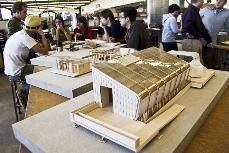Break out that high school prom gown and get ready to dance the night away under the sun.
The UA Solar Decathlon team is hosting a winter formal fundraiser called Decath-O-Prom in an effort to raise money to construct a completely solar powered house that will be entered in the Solar Decathlon Competition.
Emily Formentini, an architecture senior, said the competition is a biannual event put on by the United States Department of Energy that will take place in October 2009.
She said the goal is to design and construct a house that will completely run on solar power.
Formentini said that the prom is being held in the Sundt Gallery in the Architecture building on Jan. 31 from 7 p.m. to 11:30 p.m. with formal prom or a more fun, retro prom attire being required.
“”We really want people to have fun with it,”” she said.
Club Congress’ DJ Critter will be manning the dance floor, and there will be a faculty prom king and queen, food and drink and prom photos inside the partially constructed solar house module, said Jenny Harrison, an architecture senior.
“”We thought it would be fun to have a formal event. We’ve never had one before,”” Harrison said.
Matt Gindlesparger, faculty advisor and principle investigator said the Solar Decathlon club still needs to raise $180,000 more for the project through the prom, raffle and other fundraising and donations. They are hoping for a turn out of over 200 people.
The UA was one of only 20 schools that were selected from around the world to participate in the Solar Decathlon Competition. Gindlesparger said schools from Spain, Germany, Canada, Puerto Rico, and across the United States are also competing.
This is the first time the UA has submitted a proposal to the competition. The UA is also the first team from the Southwest to be accepted, he said.
Gindlesparger said that the team is made up of 21 architecture, engineering, material sciences, agriculture, landscaping and planning students.
Sherwood Wang, an architecture senior, said they have been designing, formulating inventive ideas, and building models of the house for the last year and finally began construction on the final project last month.
He said that they are still making adjustments to the construction plans as they go. One difficulty is that the house has to be constructed in Tucson, then transported to Washington, D.C. where it has to be put back together.
Gindlesparger said that once in D.C., the houses will have to go through a week of tests including boiling water, washing one load of laundry and dishes each day and hosting a dinner and movie night for one of the other schools inside the house.
He said the houses will also be judged on how much energy they are able to produce based on a solar grid system.
Gindlesparger said, the team hopes to bring the house back to Tucson after the competition to put it on display.
Tickets to the event cost $15 ahead of time and $20 at the door. There will also be raffle tickets for $1 each or six for $5, with the prizes being donated by local companies.









